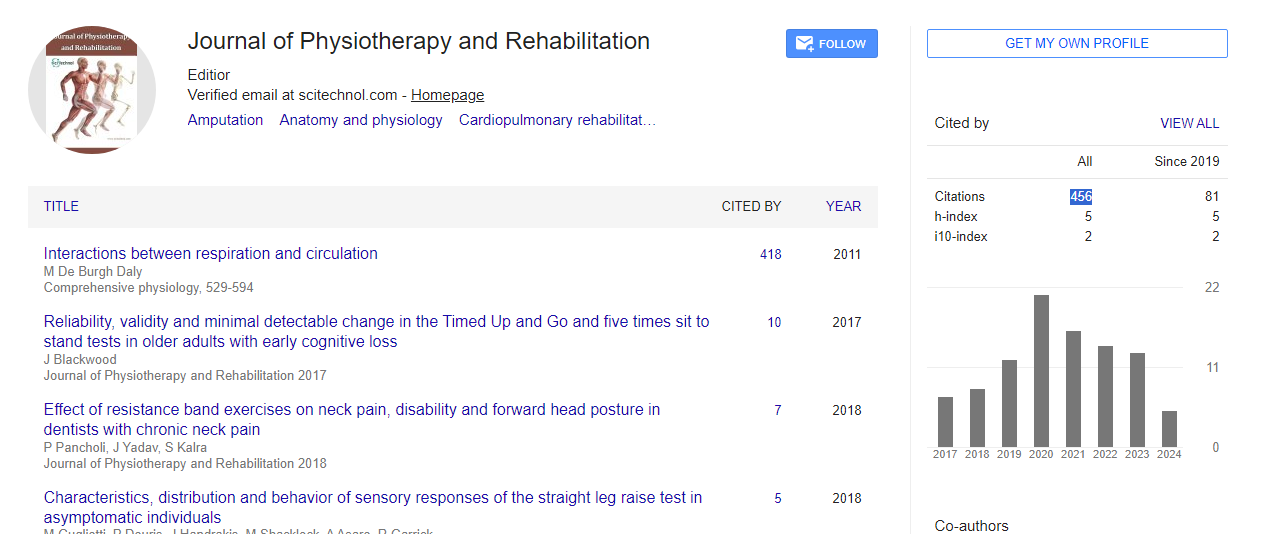Commentary, J Physiother Rehabi Vol: 7 Issue: 4
Pediatric Physiotherapy Approaches to Achieve Milestones
Maillard Roslyn*
1Department of Clinical Therapies, University of Limerick, Limerick, Ireland
*Corresponding Author: Maillard Roslyn,
Department of Clinical Therapies,
University of Limerick, Limerick, Ireland
E-mail: maillaros@ul.ie
Received date: 24 July, 2023, Manuscript No. JPTR-23-114314;
Editor assigned date: 27 July, 2023, Pre QC. JPTR-23-114314 (PQ);
Reviewed date: 10 August, 2023, QC No. JPTR-23-114314;
Revised date: 17 August, 2023, Manuscript No. JPTR-23-114314 (R);
Published date: 24 August, 2023, DOI: 10.4172/JPTR.1000144
Citation: Roslyn M (2023) Pediatric Physiotherapy Approaches to Achieve Milestones. J Physiother Rehab 7:4.
Description
Pediatric physiotherapy is a specialized field of healthcare dedicated to helping children overcome physical challenges and achieve their developmental milestones. From crawling and walking to skills and balance, children's growth and development are closely related to their physical abilities.
Developmental milestones are essential markers that track a child's progress in various areas of development. These milestones encompass physical, cognitive, social and emotional aspects of growth. Achieving these milestones within typical timeframes is vital for a child's overall well-being and future success. Pediatric physiotherapists play a vital role in helping children overcome physical barriers that may hinder their developmental progress.
Early intervention is a cornerstone of pediatric physiotherapy. Recognizing and addressing developmental delays or physical challenges as early as possible can lead to more effective interventions and better outcomes. Pediatric physiotherapists conduct thorough assessments to identify any issues that may impede a child's progress. These assessments consider factors like muscle strength, range of motion, balance and coordination.
Once developmental challenges are identified, pediatric physiotherapists create individualized treatment plans. These plans are customized to meet the unique needs and goals of each child. Factors like the child's age, specific challenges and family involvement are all considered in designing a comprehensive approach to care.
Gross motor skills involve the use of large muscle groups for activities like crawling, walking, running and jumping. Pediatric physiotherapy interventions focus on enhancing these skills. For example, a child who experiences difficulties with walking may receive gait training to improve their stride and balance.
Fine motor skills involve the coordination of smaller muscle groups for tasks like grasping objects, handwriting and garment buttoning.
Pediatric physiotherapists use exercises and activities to promote hand-eye coordination, finger dexterity and precision. These interventions are particularly important for children with conditions like cerebral palsy or developmental coordination disorder.
Balance and coordination are fundamental for various activities, from playing sports to sitting upright in class. Pediatric physiotherapy programs often incorporate exercises that challenge and improve a child's balance and coordination. These activities can include walking on uneven surfaces, balance beam exercises and specialized games.
Some children may struggle with sensory processing, which can affect their ability to interact with their environment effectively. Pediatric physiotherapists work on sensory integration techniques that help children process sensory information more efficiently. These strategies can lead to improved focus, self-regulation and overall comfort in various environments.
Children with neurological conditions, such as cerebral palsy or spina bifida, may face unique challenges in achieving developmental milestones. Pediatric physiotherapists are highly skilled in working with these children to maximize their physical potential. Therapy may include exercises to improve muscle tone, mobility and functional independence.
Pediatric physiotherapy often incorporates play-based therapy to engage children and make therapy sessions enjoyable. Play-based interventions can include games, puzzles and activities that target specific developmental goals while keeping the child motivated and interested.
Pediatric physiotherapy emphasizes family-focused treatment, recognizing that parents and caregivers play a vital role in a child's development. Therapists provide guidance and support to families, teaching them exercises and techniques to continue at home. This collaborative approach ensures that progress is supported beyond therapy sessions.
Regular progress assessments are integral to pediatric physiotherapy. Therapists closely monitor a child's development and adjust interventions as needed. This flexibility ensures that treatment plans remain aligned with a child's changing needs and developmental trajectory.
Pediatric physiotherapy is an invaluable resource for children facing developmental challenges. By targeting physical barriers and promoting the achievement of developmental milestones, pediatric physiotherapists play a pivotal role in enhancing a child's overall quality of life and future success. Through early intervention, customized treatment plans and a focus on family involvement, pediatric physiotherapy empowers children to reach their full potential.
 Spanish
Spanish  Chinese
Chinese  Russian
Russian  German
German  French
French  Japanese
Japanese  Portuguese
Portuguese  Hindi
Hindi 